Zara is a graduate of the University of Alberta in 2015.
The medical facility, known for its “malasakit”, formally opened its doors in June last year and has grown to serve not only the Filipino community but other Edmontonians.
“We wanted to answer to the call of our Kababayans to have a clinic where doctors can speak Tagalog and we were able to provide that service to them. Yet Medicus is open to all Edmontonians,” said Kris Salumbides, co-founder and marketing director of Medicus.
In a TV interview last February, Salumbides admitted that 10 years ago, he had a hard time expressing his thoughts to a family doctor who cannot speak his own language.
When Salumbides, business partner Jesse Tallon established Quality Sleep Care and Alberta Medical Supplies in 2014, the two companies were able to grow and with the coming in of another business partner Jacob Christian as director of finance, it allowed them to open Medicus Clinic last year. “It’s really comfortable for us to talk to a doctor who knows Tagalog,” he said.(Moses Billacura)
]]>- Budget 2018 and the Path to Balance
- Alberta’s economic recovery
- Market Access for Alberta’s Energy Products
- Importance of and why we are fighting for the TMX Pipelines
After the worst recession in a generation, things are looking up. Jobs are up, the deficit is down, and Alberta’s economy has been growing faster than anywhere in Canada.
Budget 2018 is focused on extending the recovery to all Albertans and continuing to build a more resilient, diversified and stable economy that is less vulnerable to oil price shocks — a recovery that is built to last.
The plan is built on three pillars:
Diversifying the economy – fighting for market access, adding value to our energy products and supporting new and developing industries.
Protecting vital public services – making sure loved ones get the care they need, young people get the best education possible and no one is left behind.
Returning to balance – investing tax dollars where they are needed most, while eliminating waste and controlling spending to return to balance by 2023-24.
Budget 2018 is focused on extending the recovery to all Albertans and continuing to build a more resilient, diversified and stable economy that is less vulnerable to oil price shocks — a recovery that is built to last.
The plan is built on three pillars:
Diversifying the economy – fighting for market access, adding value to our energy products and supporting new and developing industries.
Protecting vital public services – making sure loved ones get the care they need, young people get the best education possible and no one is left behind.
Returning to balance – investing tax dollars where they are needed most, while eliminating waste and controlling spending to return to balance by 2023-24.
The discussion became intense as the rest of the other topics were discussed particularly with the TMX Pipelines since we all know that Alberta is an oil and gas industry hub. But with what Minister Joe Ceci and Minister Irfan Sabir, the government is definitely looking after the welfare of the Albertans, thus the reason for making sure that Budget 2018 details get around even in ethnic communities since the ethnic media has a better way of imparting the information especially in their own languages and culture.
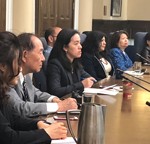
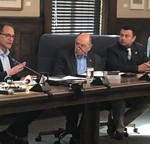
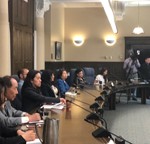
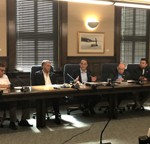
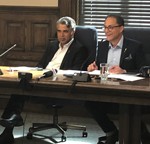
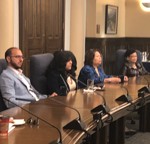
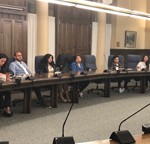
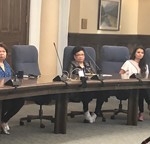
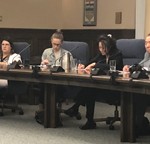
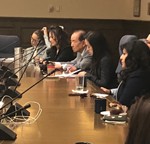
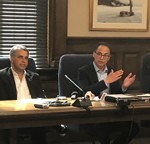
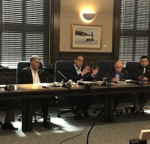
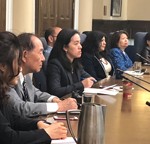
Billboards are now on display across British Columbia as the Government of Alberta launches a nationwide campaign to highlight the economic, social and environmental benefits of the Trans Mountain Pipeline expansion.
The “Keep Canada Working” campaign will inform Canadians about the benefits of market access and counter the misinformation, harassment and obstruction that the project has faced.The campaign’s goal is to speed up market access for Alberta’s energy products by increasing awareness of the benefits of an expanded pipeline and – as a result – increasing support for its speedy construction. “It is important that Canadians understand what’s at stake when we talk about the Trans Mountain Pipeline expansion. A lack of market access is costing Canadians good jobs. It is putting the national climate plan at risk. And it is costing Canada billions every year – money that could be paying for things like roads, schools and hospitals from coast to coast to coast.”Premier Rachel NotleyThe lack of access to international markets is costing the Canadian economy up to $15 billion annually, or approximately $40 million per day. The cost to Alberta government revenue alone represents about $2.3 billion per year, or $6.5 million every day.The “Keep Canada Working” message will be shared via billboards, television, radio, search engine marketing, online display and social media. Billboards and digital advertisements have been running since April 30. Television and radio advertisements are in production.The ads will direct people to KeepCanadaWorking.ca, where they can find more information on how the pipeline expansion will directly benefit Canadians and how they can get involved.Advertisements at launch include the following messages:• Trans Mountain Pipeline means more money for roads, schools and hospitals.• Trans Mountain Pipeline moves Canada’s economy forward – creating economic activity from coast to coast.• Trans Mountain Pipeline puts Canada first – making us less reliant on American markets.• Trans Mountain Pipeline is critical to Canada’s climate plan – revenue generated will fund greener energy sources and innovation.
Background:• To date, Alberta has spent $1.29 million on this nationwide advertising campaign.• About $700,000 has been dedicated to advertising in British Columbia, including digital board locations in Vancouver, Victoria, Kelowna, Kamloops and the west Kootenays, Abbotsford international and Nanaimo regional airports.• The campaign is scheduled to run from April 30 until the pipeline is in operation.• Scotiabank estimates that the discount on Canadian oil caused by pipeline bottlenecks costs producers and the Canadian economy as much as $40 million per day. • A Conference Board of Canada report has determined that the combined government revenue impact for construction and the first 20 years of expanded operations is $46.7 billion, including federal and provincial taxes that can be used for public services such as health care and education.o British Columbia receives $5.7 billiono Alberta receives $19.4 billiono The rest of Canada shares $21.6 billiono Municipal tax payments (not adjusted for inflation) total $922 million to B.C .and $124 million to Alberta over the first 20 years of expanded pipeline operations.
Related information• Keep Canada Working
to expand Canada’s Biometrics Program
April 6, 2018 – Ottawa, ON – Canada has long had one of the highest per capita rates of immigration in the world and is an attractive destination for immigrants and visitors.
Accurately establishing identity is an important part of immigration decisions and helps keep Canadians safe. For more than 20 years, biometrics (fingerprints and a photograph) have played a role in supporting immigration screening and decision-making in Canada.
In 2018, Canada intends to expand its biometrics program to all foreign nationals applying for a visitor visa, a study or work permit (excluding U.S. nationals), and to all those applying for permanent residence.
The Government of Canada encourages all Canadians to consider the importance of expanding biometrics in the context of helping facilitate the entry of travellers with legitimate identities, preventing identity fraud, and keeping Canada safe.
Canada currently collects biometrics from in-Canada refugee claimants and overseas refugee resettlement applicants, individuals ordered removed from Canada and individuals from 30 foreign nationalities applying for a temporary resident visa, work permit, or study permit.
Expanding biometrics will strengthen Canada’s immigration programs through effective screening (biometric collection, verification, and information-sharing with partner countries). It will also enable Canada to facilitate application processing and travel – while maintaining public confidence in our immigration system.
The expansion of Canada’s biometrics program, which includes the implementation of new requirements for immigration applicants, an expanded biometrics collection service network and automated fingerprint verification at ports of entry, will be rolled out over 2 years (2018 –2019).
The pre-publication and consultation period, from April 7 to May 6, 2018, is designed to give the public an opportunity to provide feedback on the text of the proposed Regulations once they are published in the Canada Gazette, Part I.
For more information, please consult canada.ca/biometrics.
Quotes
“Each year, Canada welcomes millions of visitors and accepts hundreds of thousands of students, workers and permanent residents. Canadians understand the importance of immigration to our country’s economic and social well-being. By expanding our biometrics program,we facilitate entry into Canada and protect the integrity of our immigration system, by quickly and accurately establishing a traveller’s identity. A key feature of biometrics expansion is that temporary residents will only have to provide their biometrics once every 10 years.”
– The Honourable Ahmed Hussen, Minister of Immigration, Refugees and Citizenship
“Biometrics screening helps keep Canadians safe. The collection and verification of biometrics, along with criminal and immigration screening and biometric-based information-sharing, will help prevent identity fraud, identify those who pose a security risk and stop known criminals from entering Canada.”
– The Honourable Ralph Goodale, Minister of Public Safety and Emergency Preparedness
Quick facts
- Biometrics:
- are the measurement of unique physical characteristics; and
- for Canadian immigration programs, biometrics include fingerprints and a photograph of the face.
- The scope of the expansion project will include 3 broad components:
- Collection of biometric information from all foreign nationals (excluding U.S. nationals) applying for a temporary resident visa, work permit, study permit, or temporary resident permit; and all permanent residence applicants.
- Verification: Systematic fingerprint verification at major airports, and expanded fingerprint verification at additional ports of entry (airports and land borders), for travellers who have provided their biometrics.
- Information-sharing: Increase biometric-based information-sharing between Canada and the U.S. and introduce automated biometric-based information-sharing with the other Migration 5 (formerly known as FCC – Five Country Conference) partners: Australia, United Kingdom and New Zealand.
- The Government of Canada currently collects biometrics from:
- in-Canada asylum claimants and overseas refugee resettlement applicants;
- individuals ordered removed from Canada; and
- since 2013, Canada has collected biometrics from 30 nationalities applying for a temporary resident visa, work permit, or study permit.
- Exemptions to biometrics expansion include:
- Canadian citizens, citizenship applicants (including passport applicants), or existing permanent residents;
- children under the age of 14;
- applicants over the age of 79 (there is no upper age exemption for asylum claimants);
- visa-exempt nationals coming to Canada as tourists who hold a valid electronic travel authorization (eTA);
- heads of state and heads of government;
- cabinet ministers and accredited diplomats of other countries and the United Nations, coming to Canada on official business;
- U.S. visa holders transiting through Canada;
- refugee claimants or protected persons who have already provided biometrics and are applying for a study or work permit;
- temporary resident applicants who have already provided biometrics in support of a permanent resident application that is still in progress.
source: www.cic.gc.ca
]]>With a two-year grant from the Alberta government, Learning English with CBC has improved its website to make it easier for newcomers to participate in its English language lessons. The lessons use news stories and interviews from around the province to help new Albertans learn about their communities.
The $153,566 grant will support a fully interactive website, which can be accessed on mobile devices for the first time. The stories are read at a slower pace to help learners better understand the content. To test their understanding of the stories, students of the program can submit answers and get immediate feedback.
“Our government is working hard to make life better for newcomers by helping them flourish in their workplaces and communities. We are proud to support this innovative project that will improve accessibility to free English as a Second Language resources. Our government supports initiatives that prepare newcomers for success and help this talented pool of hard-working Albertans find good jobs.”
Christina Gray, Minister of Labour
“We are very excited to continue our partnership with the Government of Alberta on Learning English with CBC. To cater to learners’ needs for on-the-go learning, we have transformed this project by combining tailored storytelling with accompanying online activities with instant feedback.”
Gary Cunliffe, managing editor, CBC Edmonton
“ATESL wishes to extend thanks and congratulations to the Learning English with CBC team. The update of this resource to focus on real-world interactions at an appropriate level and in a mobile-friendly format makes it all the more relevant and accessible to our learners.”
Kim Dudas, president, Alberta Teachers of English as a Second Language (ATESL)
Learning English with CBC started in 2011 with funding from the Alberta government. More than 1,200 people from across the province and around the globe visit the website every week.
]]>Today, the Honourable Ahmed Hussen, Minister of Immigration, Refugees and Citizenship, announced that provisions of Bill C-6 involving changes to the citizenship revocation process came into effect.
Any individual whose case is subject to possible revocation now has the choice to have their case heard and decided by the Federal Court, or to request that the Minister decide. This improves the fairness of the process by allowing all individuals to choose to have their case decided by the Federal Court, an independent judicial body. The revocation process will also include an additional step, where IRCC officials review case submissions and decide whether or not to continue to proceed with revocation before it is referred to the Federal Court for decision.
In cases where individuals request to have the Minister decide, they would have an opportunity to seek leave to judicially review the Minister’s decision at the Federal Court.
Under the former decision-making model introduced in 2015 by Bill C-24, the Minister was the decision maker for cases of residence fraud, concealed criminality and identity fraud. The Federal Court was the decision maker only for cases of fraud relating to organized criminality, security, and human and international rights violations.
For a complete list of past, current and future changes to the Citizenship Act and their effective dates, please read the Bill C-6 Backgrounder.
Quote
“In completing another important amendment to the Citizenship Act, the Government has delivered on our commitment expressed during the legislative process of Bill C-6 to enhance the procedural fairness of citizenship revocation. By continuing to build and improve this process, we are able to maintain the fairness and integrity of our program and uphold the value of Canadian citizenship.”
– The Honourable Ahmed Hussen, Minister of Immigration, Refugees and Citizenship
Quick facts
- ·Bill C-6, An Act to amend the Citizenship Act and make consequential amendments to another Act, received Royal Assent on June 19, 2017, and made changes to the revocation decision-making model introduced by Bill C-24.
- ·More changes expected to come into force later in 2018 include the new authority under the Citizenship Act for citizenship officers to seize fraudulent or suspected fraudulent documents.
source: www.cic.gc.ca
]]>
December 22, 2017 – Ottawa, ON – Canadian citizens and permanent residents will soon be able to take the first step in applying to bring their parents and grandparents to Canada, when the Parents and Grandparents Program reopens in 2018.
Immigration, Refugees and Citizenship Canada (IRCC) introduced a new process in 2017 for application intake for sponsoring parents and grandparents to make it fairer and more transparent for applicants. Now, potential sponsors must first notify IRCC that they are interested in sponsoring their parents and grandparents by submitting an “Interest to Sponsor” form. Using a random selection process, IRCC will then invite potential sponsors to apply to sponsor their parents and grandparents.
Today, the Honourable Ahmed Hussen, Minister of Immigration, Refugees and Citizenship, announced that the “Interest to Sponsor” form will be available at noon EST on January 2, 2018. Those who wish to apply to sponsor their parents and grandparents in 2018 must first fill out this online form. It will be available until noon February 1, 2018.
To help ensure the efficiency of the system and to allow as many eligible sponsors as possible to bring their parents and grandparents to Canada, it is important that only those who meet the sponsorship eligibility requirements submit an “Interest to Sponsor” form. Additional questions have been added to the 2018 version of the “Interest to Sponsor” form to help potential sponsors self-assess whether they are eligible to sponsor.
Quote
“Family reunification is a priority for the Government of Canada. On January 2, I invite those who are eligible to sponsor to express their interest to bring their parents and grandparents to Canada. Helping more people reunite with their parents and grandparents in Canada demonstrates the government’s commitment to keeping families together, leading to successful integration and stronger ties to Canada.”
– The Honourable Ahmed Hussen, Minister of Immigration, Refugees and Citizenship
]]>Great progress has been made on the backlog in recent years. As of October 1, 2017, there was a 63% reduction in the number of caregivers and their family members waiting for their permanent residence applications to be finalized since reaching its highest level in May 2014.
This fall, Immigration, Refugees and Citizenship Canada (IRCC) dedicated additional resources to process LCP applications and encourage caregivers and their family members to submit any documents that were missing from their applications. With this focus, IRCC is on track to finalize 5,000 more cases than originally planned by the end of 2017. This surge will allow IRCC to welcome 20,000 new permanent residents in the caregiver category in total this year, reaching the high end of the target range as set out in the 2017 levels plan.
Having taken these steps, IRCC is committing to:
· Finalizing a minimum of 80% of the cases that were in the LCP inventory as of October 1, 2017 by the end of 2018;
· Processing 80% of new, complete LCP applications submitted on or after October 1, 2017 within 12 months; and
· Admitting high numbers of LCP caregivers and their family members as permanent residents until the remaining cases are processed.
The multi-year levels plan for 2018-2020 set out targets for the number of permanent resident admissions in the caregiver category that will allow IRCC to meet these commitments.
Earlier this year, the Standing Committee on Citizenship and Immigration recommended that the Government deliver a plan to end the backlog of Live-in Caregiver Program applications. With this plan in place, caregivers waiting for their Live-in Caregiver Program applications to be finalized should get decisions on their cases and be reunited with their families soon.
Quote
The commitments the Government has made today will mean that many Live-in Caregiver Program applicants who have faced long delays and family separation may soon reach their goal of permanent residence. After diligently providing care for Canadians, they may soon be in the company of their own loved ones, together in Canada.
– The Honourable Ahmed Hussen, Minister of Immigration, Refugees and Citizenship
Quick facts
· The Live-in Caregiver Program was a program that offered a direct path from temporary status to permanent residence for caregivers. It closed to new applicants in 2014 but grandfathering provisions meant that thousands of caregivers who were already part of the temporary portion of the LCP but who hadn’t yet applied for permanent residence would still have the opportunity to do so. This means that up to 6,000 more applications for permanent residence under the LCP could still be submitted to IRCC.
· Further developments are expected soon on the Budget 2017 proposal to eliminate the $1,000 Labour Market Impact Assessment fee for Canadian families seeking to hire a foreign caregiver to provide care to a person with high medical needs and for Canadian families with an income less than $150,000 seeking to hire a foreign caregiver to provide childcare. Waiving this fee will help support Canadian families meet their caregiving needs.
Source: www.cic.gc.ca
]]>“Our government continues to make good on its promise to make life better for Albertans by investing in much-needed infrastructure projects like the new Calgary Cancer Centre. I’m proud to see this project begin construction, which will add jobs, boost the local economy and give hope to patients and families in Calgary and southern Alberta.”
Rachel Notley, Premier
When it opens in 2023, the Calgary Cancer Centre will offer comprehensive care, cancer research and education in a single state-of-the-art facility.
“I am thrilled to see us reach another major milestone on this long-awaited project. Strengthening health care is a priority for Albertans. It’s reassuring to know that the Calgary Cancer Centre will be there for families when they most need it.”
Sarah Hoffman, Minister of Health
“Due to the hard work of our team, I am very excited that we were able to start construction two months ahead of our original schedule. This is one of the largest construction projects underway in Alberta and will be an economic generator in Calgary and throughout southern Alberta.”
Sandra Jansen, Minister of Infrastructure
Services at the new cancer centre will include:
- outpatient cancer clinics
- more than 100 patient exam rooms
- 160 inpatient unit beds
- more than 100 chemotherapy chairs
- clinical and operational support services
- double the space for clinical trials
- research laboratories
- 15 radiation vaults
- double the capacity to treat patients with the best technology
- New on-site underground parking
“Today is a day of celebration for AHS staff and volunteers, patients and families. With construction underway, we are building a place that will improve patient care, promote wellness and help staff and physicians deliver the best care possible. We are building hope.”
Dr. Verna Yiu, president and CEO, Alberta Health Services
“My wife Rebecca’s legacy lives on in what she wanted the new Calgary Cancer Centre to be: a place of openness and a healing environment where patients will be given every chance possible to overcome their illness, and a place that radiates hope.”
Will Morlidge, Calgary Cancer Centre patient and family advisor
PCL Construction Management Inc. was selected to design and build the Calgary Cancer Centre, which will be located on the Foothills Medical Centre site with an elevated walkway connecting the new facility with existing buildings.
Due to construction, the west lane and sidewalk on 29 Street will be closed, with pedestrian traffic diverted to the east side of the street. Excavation, shoring and piling activity will begin in November and run to spring 2018.
Key dates
- construction: 2017-22
- operational commissioning for AHS: 2022-23
- anticipated public opening: 2023